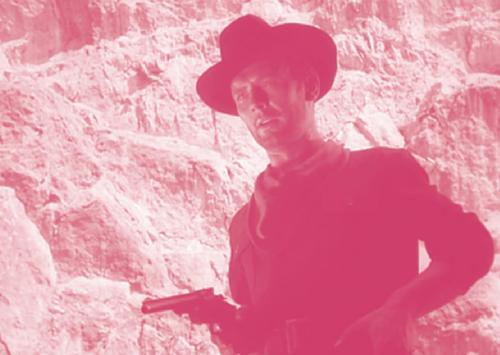The Roads We Take 我们选择的道路
2020-03-08欧·亨利王永年
欧·亨利 王永年

Twenty miles west of Tucson1 the “Sunset Express” stopped at a tank to take on water. Besides the aqueous addition the engine of that famous flyer acquired some other things that were not good for it.
While the fireman was lowering the feeding hose, Bob Tidball, “Shark” Dodson, and a quarter-bred Creek Indian called John Big Dog climbed on the engine and showed the engineer three round orifices in pieces of ordnance that they carried. These orifices so impressed the engineer with their possibilities that he raised both hands in a gesture such as accompanies the ejaculation “Do tell!”
At the crisp command of Shark Dodson, who was leader of the attacking force, the engineer descended to the ground and uncoupled the engine and tender. Then John Big Dog, perched upon the coal, sportively held two guns upon the engine driver and the fireman, and suggested that they run the engine fifty yards away and there await further orders.
Shark Dodson and Bob Tidball, scorning to put such low-grade ore as the passengers through the mill, struck out for the rich pocket of the express car. They found the messenger serene in the belief that the “Sunset Express” was taking on nothing more stimulating and dangerous than aqua pura. While Bob was knocking this idea out of his head with the butt-end of his six-shooter Shark Dodson was already dosing the express-car safe with dynamite.
The safe exploded to the tune of $30,000, all gold and currency. The passengers thrust their heads casually out of the windows to look for the thunder-cloud. The conductor jerked at the bell rope, which sagged down loose and unresisting, at his tug. Shark Dodson and Bob Tidball, with their booty in a stout canvas bag, tumbled out of the express car and ran awkwardly in their high- heeled boots to the engine.
The engineer, sullenly angry but wise, ran the engine, according to orders, rapidly away from the inert train. But before this was accomplished the express messenger, recovered from Bob Tidballs persuader to neutrality, jumped out of his car with a Winchester rifle and took a trick in the game. Mr. John Big Dog, sitting on the coal tender, unwittingly made a wrong lead by giving an imitation of a target, and the messenger trumped him. With a ball exactly between his shoulder blades the Creek chevalier of industry rolled off to the ground, thus increasing the share of his comrades in the loot by one-sixth each.
Two miles from the tank the engineer was ordered to stop.
The robbers waved a defiant adieu and plunged down the steep slope into the thick woods that lined the track. Five minutes of crashing through a thicket of chaparral brought them to open woods, where the three horses were tied to low-hanging branches. One was waiting for John Big Dog, who would never ride by night or day again. This animal the robbers divested of saddle and bridle and set free. They mounted the other two with the bag across one pommel, and rode fast and with discretion through the forest and up a primeval, lonely gorge. Here the animal that bore Bob Tidball slipped on a mossy boulder and broke a foreleg. They shot him through the head at once and sat down to hold a council of flight. Made secure for the present by the tortuous trail they had traveled, the question of time was no longer so big. Many miles and hours lay between them and the spryest posse that could follow. Shark Dodsons horse, with trailing rope and dropped bridle, panted and cropped thankfully of the grass along the stream in the gorge. Bob Tidball opened the sack, and drew out double handfuls of the neat packages of currency and the one sack of gold and chuckled with the glee of a child.
“Say, you old double-decked pirate,” he called joyfully to Dodson, you said we could do it—you got a head for financing that knocks the horns off of anything in Arizona.”
“What are we going to do about a hoss for you, Bob? We aint got long to wait here. Theyll be on our trail before daylight in the mornin. ”
“Oh, I guess that cayuse of yournll carry double for a while,” answered the sanguine Bob. “Well annex the first animal we come across. By jingoes, we made a haul, didnt we? Accordin to the marks on this money theres $ 30,000— $ 15,000 apiece! ”
“Its short of what I expected,” said Shark Dodson, kicking softly at the packages with the toe of his boot. And then he looked pensively at the wet sides of his tired horse.
“Old Bolivars mighty nigh played out,” he said, slowly. “I wish that sorrel of yours hadnt got hurt.”
“So do I,” said Bob, heartily, “but it cant be helped. Bolivars got plenty of bottom—hell get us both far enough to get fresh mounts. Dang it, Shark, I cant help thinkin how funny it is that an Easterner like you can come out here and give us Western fellows cards and spades in the desperado business. What part of the East was you from, anyway?”
“New York State, said Shark Dod-son, sitting down on a boulder and chewing a twig. “I was born on a farm in Ulster County. I ran away from home when I was seventeen. It was an accident my cornin West. I was walkin along the road with my clothes in a bundle, makin for New York City. I had an idea of goin there and makin lots of money. I always felt like I could do it. I came to a place one evenin where the road forked and I didnt know which fork take: I studied about it for half an hour and then I took the left-hand. That night I run into the camp of a Wild West show that was travelin among the little towns, and I went West with it. Ive often wondered if I wouldnt have turned out different if Id took the other road.”
“Oh, I reckon youd have ended up about the same,” said Bob Tidball, cheerfully philosophical. “It aint the roads we take; its whats inside of us that makes us turn out the way we do.”
Shark Dodson got up and leaned against a tree.
“Id a good deal rather that sorrel of yourn hadnt hurt himself, Bob,” he said again, almost pathetically.
“Same here,” agreed Bob; “he sure was a first-rate kind of a crowbait. But Bolivar, hell pull us through all right. Reckon wed better be movinon, hadnt we, Shark? Ill bag the boodle agin and well hit the trail for higher timber.”
Bob Tidball replaced the spoil in the bag and tied the mouth of it tightly with a cord. When he looked up the most prominent object that he saw was the muzzle of Shark Dodsons .45 held upon him without a waver.
“Stop your funnin,” said Bob, with a grin. “We got to be hittin the breeze.”
“Set still,” said Shark. “You aint goin to hit no breeze, Bob. I hate to tell you, but there aint any chance for but one of us. Bolivar, hes plenty tired, and he cant carry double.”
“We been pards, me and you, Shark Dodson, for three years,” Bob said quietly. “Weve risked our lives together time and again. Ive always give you a square deal, and I thought you was a man. Ive heard some queer stories about you shootin one or two men in a peculiar way, but I never believed em. Now if youre just havin a little fun with me, Shark, put your gun up, and well get on Bolivar and vamose. If you mean to shoot—shoot, you blackhearted son of a tarantula!”
Shark Dodsons face bore a deeply sorrowful look.
“You dont know how bad I feel,” he sighed, “about that sorrel of yourn breakin his leg, Bob.”
The expression on Dodsons face changed in an instant to one of cold ferocity mingled with inexorable cupidity. The soul of the man showed itself for a moment like an evil face in the window of a reputable house.
Truly Bob Tidball was never to “hit the breeze” again. The deadly .45 of the false friend cracked and filled the gorge with a roar that the walls hurled back with indignant echoes. And Bolivar, unconscious accomplice, swiftly bore away the last of the holders-up of the “Sunset Express”, not put to the stress of “carrying double”.
But as Shark Dodson galloped away the woods seemed to fade from his view; the revolver in his right hand turned to the curved arm of a mahogany chair; his saddle was strangely upholstered, and he opened his eyes and saw his feet, not in stirrups, but resting quietly on the edge of a quartered-oak desk.
I am telling you that Dodson, of the firm of Dodson & Decker, Wall Street brokers, opened his eyes. Peabody, the confidential clerk, was standing by his chair, hesitating to speak. There was a confused hum of wheels below, and the sedative buzz of an electric fan.
“Ahem! Peabody,” said Dodson, blinking. “I must have fallen asleep. I had a most remarkable dream. What is it, Peabody?”
“Mr. Williams, sir, of Tracy & Williams, is outside. He has come to settle his deal in X. Y. Z. The market caught him short, sir, if you remember.”
“Yes, I remember. What is X. Y. Z. quoted at today, Peabody?”
“One eighty-five, sir.”
“Then thats his price.”
“Excuse me,” said Peabody, rather nervously, “for speaking of it, but Ive been talking to Williams. Hes an old friend of yours, Mr. Dodson, and you practically have a corner in X. Y. Z. I thought you might—that is, I thought you might not remember that he sold you the stock at 98. If he settles at the market price it will take every cent he has in the world and his home too to deliver the shares.”
The expression on Dodsons face changed in an instant to one of cold ferocity mingled with inexorable cupidity. The soul of the man showed itself for a moment like an evil face in the window of a reputable house.
“He will settle at one eighty-five.” said Dodson. “Bolivar cannot carry double.”
“落日快車”在塔克森以西二十英里的一座水塔旁边停下来加水。那列著名快车的车头除了加水,还加了一些对它不利的东西。
火夫放下输水管的时候,三个人爬上了车头:鲍勃·蒂德博尔、“鲨鱼”多德森和有四分之一克里克印第安血统的约翰·比格道格。他们把带在身边的三件家伙的圆口子对准了司机。司机被这些口子所暗示的可能性吓得举起了双手,仿佛要说:“不至于吧!”
进攻队伍的头儿,鲨鱼多德森,利索地发了一个命令,司机下了车,把车头和煤水车同列车脱开。接着,约翰·比格道格蹲在煤堆上,开玩笑似的用两支手枪分别对着司机和火夫,吩咐他们把车头开出五十码,在那里听候命令。
鲨鱼多德森和鲍勃·蒂德博尔认为旅客是品位不高的矿石,没有筛选的价值,便直奔特别快车的富矿。他们发现押运员正自得其乐地认为“落日快车”也就运运清水,没什么危险刺激的东西。鲍勃用六响手枪的枪柄把这个念头从他脑袋里敲了出去,与此同时,鲨鱼多德森已经动手用炸药炸开了快车车厢的保险柜。
保险柜炸开后,发现有三万元之多,全是金币和现钞。旅客们漫不经心地从窗口探出头去看看哪里有雷雨云。列车员急忙拉铃索,可是已被割断的绳索一拉就软绵绵地脱落下来。鲨鱼多德森和鲍勃·蒂德博尔把他们的战利品装进一只结实的帆布袋,跳出车厢朝车头跑去,高跟的马靴使他们在奔跑时有些蹒跚。
司机正生着闷气,人却不傻,他遵照命令把车头迅速驶离不能动弹的列车。然而在车头开出之前,押运员已经从鲍勃·蒂德博尔迫使他退居中立的一击下苏醒过来。他抓起一支温彻斯特来复枪跳出车厢,加入了这场争斗。坐在煤水车上的约翰·比格道格先生无意中成了靶子,头一个被瞄上,押运员打中了他。子弹恰恰打进他两片肩胛骨中间,这个克里克的骗子一个跟头栽到地上,让他的伙伴每人多分到六分之一的赃款。
车头开到离水塔两英里时,司机被命令停车。
两个强盗大模大样地挥手告别,然后冲下陡坡,在路轨旁边的密林中消失了。他们在矮槲树林里横冲直闯了五分钟之后,到了开阔的林地,那儿有三匹马给拴在低垂的树枝上。其中一匹是等候约翰·比格道格的,但是无论白天黑夜,他再也骑不成马了。两个强盗卸掉这头牲口的鞍辔,放了它。他们跨上另外两匹马,把帆布袋搁在一匹马的鞍头上,审慎而迅速地穿过树林,驰进一个原始的荒凉峡谷。在这里,鲍勃·蒂德博尔的坐骑在一块长满苔藓的岩石上打了滑,摔折了前腿。他们立刻朝它脑袋开了一枪,然后坐下来讨论怎样远走高飞。由于他们所走的路径盘旋曲折,暂时可保安全,时间的问题不像先前那么严重了。追踪而来的搜索队,即使矫健非凡,在时间和空间上同他们还隔着一大段距离。鲨鱼多德森的马已经松开笼头,拖着缰绳,喘着气在峡谷的溪流边上大吃青草。鲍勃·蒂德博尔打开帆布袋,双手抓起扎得整整齐齐的现钞和一小袋金币,像小孩一般咯咯笑起来。
“喂,你这个双料强盗,”他快活地招呼多德森,“你说我们准能行——在金融事业上,你的头脑可真行,整个亚利桑那都找不到你的对手。”
“你没有坐骑怎么办呢,鲍勃?我们不能在这里多耗时间。明早天没亮,他们就会追来的。”
“哦,我想你那匹小野马暂时驮得动我们两个人。”乐天派的鲍勃回答说,“路上一见到马,我们就征用一匹。天哪,我们发了一笔财,不是吗?看钱上的标签,一共三万,每人一万五!”
“比我预料的要少。”鲨鱼多德森说,用靴尖轻轻踢着钞票捆。接着,他沉思地瞅着他那匹跑累的马汗水淋漓的胁腹。
“老博利瓦差不多要累垮啦。”他慢吞吞地说,“我真希望你的栗毛马没有摔伤。”
“我也这样希望。”鲍勃劲头十足地说,“不过那也是没有办法的事。博利瓦的脚力很健——它能把我们驮到可以换新坐骑的地方。妈的,鲨鱼,我想起来就纳闷,像你这样的一个东部人来到这里,在这种亡命勾当中居然能胜过我们西部人。你究竟是东部哪里的人?”
“纽约州。”鲨鱼多德森说着在一块岩石上坐下,嘴里嚼着一根小树枝,“我出生在厄斯特县的一个农庄,十七岁的时候从家里跑了出来。我来到西部完全是一个偶然的机遇。当时我挎着一小包衣服,沿路走去,想到纽约市。我打算到那里去挣大钱。我一直觉得我能行。一天傍晚,我到了一个岔路口,不知道该走哪一条路。我琢磨了半个小时,终于选择了左面的一条。就在那天晚上,我遇到一个在乡镇巡演的西部戏班子,我跟着他们来到了西部。我常想,如果当时我选择了另一条路,会不会成为另一种人。”
“哦,我想结果还是一样的。”鲍勃·蒂德博尔愉快而带有哲理地说,“我们选择的道路关系不大;我们成为哪一种人,完全由本质决定。”
鲨鱼多德森站起来,靠在一棵树上。
“我真不愿意你那匹栗毛马摔伤,鲍勃。”他又说了一遍,几乎有点儿伤感。
“我也不愿意,”鲍勃附和说,“它确实是匹头挑的快马。但是博利瓦准能帮我们渡过难关的。我们还是赶紧上路吧,好吧,鲨鱼?我把钱装好,我们上路找一个更妥当的地方吧。”
鲍勃·蒂德博尔把抢来的钱重新装进帆布袋,用绳索扎紧袋口。他抬起头时发现有个东西对准了他,极其扎眼,那是鲨鱼多德森手里握得四平八稳的四五口径手枪的枪口。
“别开玩笑。”鲍勃咧着嘴说,“我们还得赶路呢。”
“别动。”鲨鱼说,“你不必赶路了,鲍勃。我不得不告诉你,我们中间只有一个人有机会逃脱。博利瓦已经够累的了,驮不动两个人。”
“鲨鱼多德森,你我搭档已有三年,”鲍勃平静地说,“我们一起出生入死也不止一次。我一向同你公平交易,满以为你是条汉子。我曾听到一些古怪的传说,说你暗地里杀过一两个人,但是我从不相信。如果你只是同我开开小玩笑,鲨鱼,那就收起你的枪,让我们骑上博利瓦赶路。如果你存心要枪杀我——那就杀吧,你这个毒蜘蛛养的黑心小子!”
鲨鱼多德森的神色显得十分悲哀。
“你不了解,鲍勃,”他叹了一口气说,“你那匹栗毛马摔折了腿,我有多难过。”
刹那间,多德森换了一副凛冽的凶相,还夹杂着一种冷酷的贪婪。那个人的灵魂暴露了片刻,像一幢体面的房子的窗口出现了一张邪恶的脸庞。
一点儿不假,鲍勃·蒂德博尔不必再赶路了。那个假朋友致命的四五口径手枪砰的一声,在山谷间布满了吼号,石壁响起了愤愤不平的回音。博利瓦,那个不自知的同谋者,驮着抢劫“落日快车”的最后一个强盗飞快地驰走,没有被强迫“驮两个人”。
在鲨鱼多德森疾驰而去时,他眼前的树林似乎逐渐消失了;他右手握的枪变成了桃花心木椅子的弯扶手;他的马鞍奇怪地装上了弹簧——他睁眼一看,发现自己的脚并没有踩在马镫上,而是安详地搁在那张直纹橡木办公桌的桌边。
我想告诉各位的是:华尔街经纪人、多德森—德克尔公司的多德森睁开了眼睛。机要秘书皮博迪站在他的椅子旁边,嗫嗫嚅嚅地正想说话。楼下传来杂乱的车轮声,屋里是电风扇催人欲眠的营营声。
“呃嗯!皮博迪,”多德森眨了眨眼睛说,“我准是睡着了。我做了一个非常奇怪的梦。有什么事吗,皮博迪?”
“特雷西—威廉斯公司的威廉斯先生等在外面。他是来结算那笔X. Y. Z.股票账目的。他拋空失了风,您大概还记得吧,先生。“
“对,我记得。今天X. Y. Z.是什么行情,皮博迪?”
“一块八毛五,先生。”
“那就按这个行情结账好啦。”
“对不起,我想说一句,”皮博迪局促不安地说,“我刚才同威廉斯谈过。多德森先生,他是您的老朋友,事实上您垄断了X. Y. Z.股票。我想您也许——呃,您也许不记得他賣给您的价钱是九毛八。如果要他按市场行情结账,那他就得倾家荡产变卖掉一切才能交割。”
刹那间,多德森换了一副凛冽的凶相,还夹杂着一种冷酷的贪婪。那个人的灵魂暴露了片刻,像一幢体面的房子的窗口出现了一张邪恶的脸庞。
“他得按一元八毛五的行情结账。”多德森说,“博利瓦驮不动两个人。”
[本文选自《欧·亨利短篇小说选》(名著名译英汉对照读本),商务印书馆,2019]
1美国亚利桑那州南部城市。
